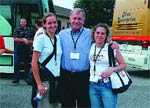Lexington equine event exceeds expectations
Lexington, Ky.-On Labor Day weekend, leading Lexington practitioners wanted to send a message to veterinary students tracking in equine medicine.
Lexington, Ky.-On Labor Day weekend, leading Lexington practitioners wanted to send a message to veterinary students tracking in equine medicine.
"There are over 7 million horses in the United States today. There aren't enough equine practitioners in the country. There aren't enough coming out of school. Somebody needs to champion equine practice," says Dr. Bill Rood, partner and CEO of Rood and Riddle Equine Hospital.

Dr. Bill Rood of Rood and Riddle Equine Hospital in Lexington, Ky., gets acquainted with students during a weekend event he co-sponsored to help future veterinary practitioners explore options in equine medicine.
Champion equine medicine is exactly what Rood's hospital did, collaborating with Hagyard-Davidson-McGee Associates, also in Lexington, to host an event for students boasting prospects in equine medicine over the three-day weekend.
Titled "Opportunities in Equine Veterinary Practice," the first-of-its-kind three-day weekend, packed with 16 speakers, was the vision of Dr. Andrew Clark, MBA, an equine practice consultant who shared his concept with Rood.
"We thought it would be fun to invite all incoming juniors in veterinary school to Lexington all expenses paid," says Rood, of the weekend, which he hopes to turn into an annual occasion.
The weekend drew 330 students from 31 veterinary schools in North America. Speakers addressed topics such as surgery, medicine, racetrack medicine, practice ownership, internships, financial remuneration and balancing equine practice and motherhood.
Dr. Marsha Heinke, DVM Newsmagazine contributor and consultant, who spoke to students about financial remuneration, says she was as enthused as the students about the turnout.
"Having sat through multiple talks by veterinarians, many of whom aren't public speakers and hear them speak from the heart in different capacities really was amazing, emotional," she says.
She says she hopes students retain the positive message about careers in equine medicine. "One recurring theme was: a career as a veterinarian is not necessarily a financial homerun, but if you stay true to the course through continual improvement, challenging yourself to see as many cases as you can, refine and hone your skills to become very good, work hard, do all those things, the only thing that holds you back is yourself."

Dr. Deborah Spike-Pierce, Rood and Riddle Equine Hospital, was one of 16 speakers.
In addition to attending seminars, students were invited on tours of six thoroughbred farms and two equine hospitals (Rood and Riddle Equine Hospital and Hagyard-Davidson-McGee Associates). Students also spent a day at Keeneland Racetrack.
Rood says pursuing the event was an easy decision given personal concerns that veterinary schools aren't adequately singing the praises of equine medicine careers.
"They tell kids in one fashion or another - in equine practice you don't make a lot of money. We're telling them that's not true," he says. "We also want (students) to know working with horses is a lot of fun. If our practice and career is not being accurately represented at the veterinary schools, then the equine practitioners will take it upon ourselves to show what wonderful opportunities exist in equine medicine."
According to AVMA statistics, equine practitioners are highest paid, averaging $108,000 a year after several years out of college; small animal practitioners, by comparison, average $82,000.
Money issues aside, Ryan Carpenter, third-year veterinary student at the University of California, Davis, always wondered if Lexington, Ky., the "Horse Capital of the World," lived up to its title.
He got his chance to find out by attending the Kentucky event.
"I had heard a lot about Kentucky and the horses and clinics and wanted to see it in person. Actually, it was a lot greater than I ever imagined. It was breathtaking," he says.
Rood says the event overwhelmingly surpassed any organizer's best anticipations.
At the conclusion of the event, Rood collected surveys seeking comments on the weekend. Student feedback included:
- "Hearing others' stories and experiences reminded me why I wanted to be a veterinarian."
- "It was very surprising and refreshing to see no expense spared and a truly 'wow' weekend! I would have paid to attend this conference, but it is even better because it was complimentary."
- "I suppose I had many misconceptions about the opportunities available for equine trackers, how challenging the equine profession can be, and quality of care provided to racehorses. This weekend served to dispel many of those misinformed ideas."
Industry supporters of the event included Milburn Distributions, Bayer Corp., Fort Dodge Animal Health, Merial, Boehringer-Ingelheim, Intervet, Pfizer and Primedia Equine Network. Professional organization support came from the American College of Veterinary Internal Medicine and the American College of Veterinary Surgeons. Nearly 50 private practices also contributed funds.